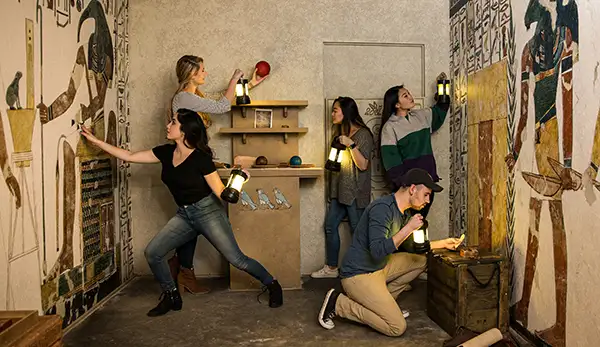Escape Room Minneapolis Mall of America-- Immersive and Enjoyable
Escape Room Minneapolis Mall of America-- Immersive and Enjoyable
Blog Article
Team Methods: How to Work together Successfully in an Escape Room
Browsing the complexities of a retreat room demands more than mere interest; it requires a well-coordinated method based in clear interaction, critical duty projects, and proficient time administration. Teams must actively listen per participant's understandings, appoint functions that straighten with private strengths, and maintain normal check-ins to guarantee focus and prevent redundancy. By promoting a setting that values cohesion and flexibility, groups can dramatically heighten their effectiveness and success prices. The nuances of these techniques can transform the experience, yet just how precisely can they be executed to optimize the capacity for success?
Establish Clear Interaction

To help with clear communication, it is necessary to mark a main point of contact for info circulation. Short, focused updates from each team participant can maintain the group informed without frustrating them with details.
Designate Roles Tactically
While clear interaction sets the structure for effective synergy, assigning roles purposefully makes certain that each team member's strengths are made use of properly. In an escape area situation, the time-sensitive and intricate nature of obstacles necessitates an efficient approach to task delegation. By determining and leveraging individual competencies, groups can enhance their analytic abilities and enhance total performance.
Someone with a keen eye for information may excel in locating surprise items, while a logical thinker can be better matched to fixing problems. This duty frequently requires strong business and interpersonal abilities.
Second, make sure that functions are flexible and versatile. As new difficulties emerge, the team should be able to pivot, reallocating jobs as required. This adaptability assists preserve energy and stops bottlenecks that can happen due to rigid function jobs.
Inevitably, a strategic technique to duty project not just takes full advantage of the strengths of each employee but likewise cultivates a cohesive atmosphere, driving the team in the direction of a successful escape.
Utilize Diverse Skills
Acknowledging and using the diverse skills within your group can substantially boost your performance in an escape read this area. Each team member brings distinct toughness to the table, and efficiently leveraging these capabilities can expedite problem-solving and enhance overall performance. A team participant with solid logical skills may stand out at analyzing complex codes or patterns, while another with eager empirical capabilities may promptly spot surprise ideas that others might overlook.
Motivate group participants to articulate their understandings and ideas quickly, making sure that all possible services are considered. Additionally, appointing tasks that align with each participant's toughness can stop bottlenecks and make sure that progress is continuous.
Additionally, diversity in skills frequently converts to diversity in believing styles, which is vital in a retreat room setup. While some obstacles may need logical thinking and precision, others could gain from creative and lateral thinking. By recognizing and leveraging this diversity, groups can resolve a broader series of obstacles better, consequently enhancing their opportunities of a successful getaway.
Manage Time Efficiently

Recognize noticeable problems and divide tasks based on group members' staminas, guaranteeing that no one is idle. This method can help keep the group focused and avoid time from sliding away undetected.
Furthermore, prevent one-track mind. If a puzzle is taking also long, revolve employee or proceed to another obstacle, returning later with fresh perspectives. Interaction is critical-- maintain everyone upgraded on resolved problems and continuing to be tasks to stay clear of redundant initiatives.
Finally, utilize any hints or clues moderately yet purposefully - best escape room. Knowing when to request for aid can save valuable time. By adhering to these time administration principles, groups can dramatically improve their possibilities of an effective and enjoyable escape space experience
Debrief and Mirror
Reflection is a necessary facet of team growth and renovation in the context of escape spaces. When the challenge is finished, whether effectively or not, it is essential for the group to engage in an organized debriefing session. This process allows staff member to examine their performance, identify toughness, and identify areas for improvement.
Begin the debrief by reviewing what went well. Highlight details circumstances of reliable communication, analytic, and cooperation. Recognizing these positive actions reinforces them and urges their repeating in future challenges.
Next, deal with the challenges experienced. Go over moments of confusion, miscommunication, or inadequate methods. Encourage an open and useful discussion where employee can share their perspectives without fear of criticism. This promotes a culture of continuous enhancement and discovering.
Conclusion
In verdict, effective collaboration in a getaway room is based upon clear interaction, critical role assignments, the efficient utilization of diverse skills, and efficient time management. Routine check-ins and structured debriefings are important for keeping focus and promoting continual improvement. By creating a cohesive and flexible group environment, the chance of efficiently resolving problems and these details attaining the objective of leaving the room is significantly enhanced. This method not only makes sure success yet likewise promotes collective development and discovering.
Report this page